Israeli start-up DOTS (Data Of The Soil) has launched a new technology that could have a dramatic impact on global agriculture, sustainability and the health of the global population: an electro-optical sensor and information system which helps users optimize fertilizer usage based on continuous and readily available soil data, making it possible to significantly reduce the use of fertilizers.
The technology is set to mitigate agriculture’s damage to the environment from groundwater contamination, air pollution and greenhouse gas emissions, and may also significantly improve the quantity, quality and shelf life of the crops, which will benefit both growers and consumers.
DOTS has raised half a million dollars from the Israel Innovation Authority, in addition to $1.2 million from Labs/02, whose investors include OurCrowd and the multinational Indian corporation Reliance Industries. The company is preparing to raise additional capital to support the product’s development and bring it to market.
DOTS is first targeting the irrigated crop market, which is worth around $25 billion. The technology is set to boost farmers’ profits by tens of percent and support global efforts for sustaining water resources and preventing groundwater pollution, among other benefits. DOTS is signing partnership agreements with large European and American companies that are interested in harnessing the technology to improve fertilizer application, boost savings, and mitigate agriculture’s damaging effect on water sources and public health.
By detecting and monitoring soil fertilization levels, DOTS enables accurate timing of fertilization cycles and prevents fertilizer overuse. Comparing the sensor to standard laboratory tests shows that the accuracy of the technology is above 92%. Moreover, a series of successful experiments in Israeli tomato greenhouses have demonstrated fertilizer savings of 30% during the growing season, without any damage to the resulting crop.

Nitrate is a nice trait (for soil to possess)
The technology is the result of a seven-year study by Prof. Ofer Dahan, Dr. Elad Yeshno of the Zuckerberg Institute for Water Research, and Prof. Shlomi Arnon of the Department of Electrical and Computer Engineering at Ben-Gurion University. They developed a first-of-its-kind system that is based on algorithmically driven spectral analysis, which enables continuous and real-time measurement of nitrate levels in soil.
Nitrate is a key nutrient for plant growth and plays a crucial role in agriculture in regards to fertilization. It is one of the forms of nitrogen that plants can absorb and use to produce proteins, nucleic acids, and other essential compounds. However, excess nitrate in soil can have several negative impacts on the environment and human health, and as such the development of monitoring solutions has become a necessary addition to farmers’ toolkits.
“The impact of fertilizers on crop quality and quantity, together with the lack of technology for continuous fertilizer monitoring in the soil, has led the agricultural industry to a ‘better safe than sorry’ policy in an effort prevent nutrient deficiencies and loss of crops,” explained Rafi Levi, cofounder and CEO of DOTS.
“This process translates into heavy capital losses for farmers as well as major environmental damage in the form of groundwater contamination and, no less serious, considerable greenhouse gas emissions (both CO2 and N2O). This is a critical global problem that threatens both the planet and human health.”
The DOTS system provides a highly detailed, dynamic picture of nitrate concentrations in the root zone and in the future, the company’s system will interface with farmers’ fertilization and irrigation controllers and allow optimal fertilization in a fully automated manner based on real-time nitrate measurements.
Yeshno, cofounder and CTO of DOTS, further highlighted the technology as a solution to the issue of nutrient pollution.
“Over the years, no practical and cost-effective technology has been found to measure the amount of fertilizer in the soil. Moreover, the European Union regards pollution from nitrate as an immediate danger to water resources and accordingly has issued a Nitrates Directive to find a solution to the problem and reduce fertilizer overuse in agriculture. As a result, environmental bodies such as the US EPA, governments around the world, and major bodies such as the United Nations and the European Union need an effective tool in the effort of reducing excessive fertilization during agricultural activity,” he said.
“We intend to act at all levels to demonstrate to legislators and the regulators the capabilities of our new and groundbreaking tool, which achieves optimal application of fertilizers at minimal cost, thereby significantly reducing pollution as a result of agricultural activity.”
Elad Yeshno
“We intend to act at all levels to demonstrate to legislators and the regulators the capabilities of our new and groundbreaking tool, which achieves optimal application of fertilizers at minimal cost, thereby significantly reducing pollution as a result of agricultural activity,” said Yeshno.
